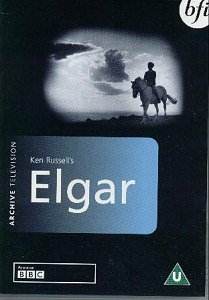This celebrated film was once voted as one of the most
memorable TV programmes ever by readers of The Sunday Times.
In fact, the BBC was taken aback by its success. It enjoyed one of the
highest rankings of all time – 98% of viewers expressing satisfaction.
It was filmed in 1962 at a time when Elgar’s music
– and, it has to be said, British music in general, was in the doldrums.
Personally speaking, I well remember being heartily criticised for daring
to include Elgar’s Symphony No. 2 in a programme I presented to the
Peterborough Recorded Music Society in Elgar’s centenary year of 1957
– "why choose music from that old has-been – it’s nothing but vulgar
tub-thumping jingoistic nonsense", I was reprimanded. A typical
opinion in those days! Indeed, several weeks later when I went to a
performance of Elgar’s The Kingdom at London’s Albert Hall, there
seemed to be more people in the choir and the orchestra than in the
audience!
But this wonderful (yet flawed) film changed all that.
From the time it was broadcast, new recordings, and new books, shedding
more and more light on the composer’s life and works appeared in increasing
numbers.
Quoting the DVD box notes, "Made at a time when
much that is now known about Elgar had yet to be published, Russell’s
film is remarkable for its sensitive portrait of the rise of a young
musician from a relatively poor background [his father’s music shop
in Worcester where he taught himself music theory and to play a variety
of instruments] to international fame."
So many of the film’s stunningly beautiful black and
white images linger in the memory: the boy Elgar riding on a white pony
over the Malvern Hills (not strictly accurate) and of Elgar as a young
man cycling there to the strains of the Introduction and Allegro
for Strings. Another striking image is the superimposition of three
crosses on the Malvern Hills as one hears the ‘Sanctus fortis, sanctus
Deus’ from The Dream of Gerontius. Indeed Malvern and the Malvern
Hills were the main location for the filming, achieved remarkably quickly
over just three weeks-or-so on a shoe-string budget, using borrowed
costumes, make-shift make-up and Russell’s friends as actors. (One of
the few professionals employed was the man who played the older Elgar).
For this film it was decreed that the actors should not speak and, for
the most part they are seen in long shot. [Four years later when Ken
Russell was to create his other composer-biography on Delius he had
much greater freedom.]
There are faults. The pedantic can pick up minor errors
of fact but these do not detract from the enjoyment of the film. The
most serious difficulties are the tedious over-stretched visuals of
the funeral of King Edward VII shown over the Larghetto of the
Second Symphony, the over-emphasis of World War I tragedies and Russell’s
assertion that Elgar had consequently turned against his Pomp and
Circumstance March No.1. in 1924.
Despite its few flaws this is a wonderful film and
it is highly recommended to all Elgarians – particularly to younger
viewers, or to those just beginning to become acquainted with the Elgar’s
music. The additional features are fascinating, particularly Elgar filmed
as conductor and at the Three Choirs Festivals (with people like W.H.
Reed, Bernard Shaw and Sir Ivor Atkins). The spontaneous commentary
by Ken Russell and Michael Kennedy is illuminating (amazing how much
they seemed to have forgotten) and it is worth noting that Russell informs
that he is working on a new ITV South Bank Show film called ‘Elgar Recycled’.
Ian Lace


